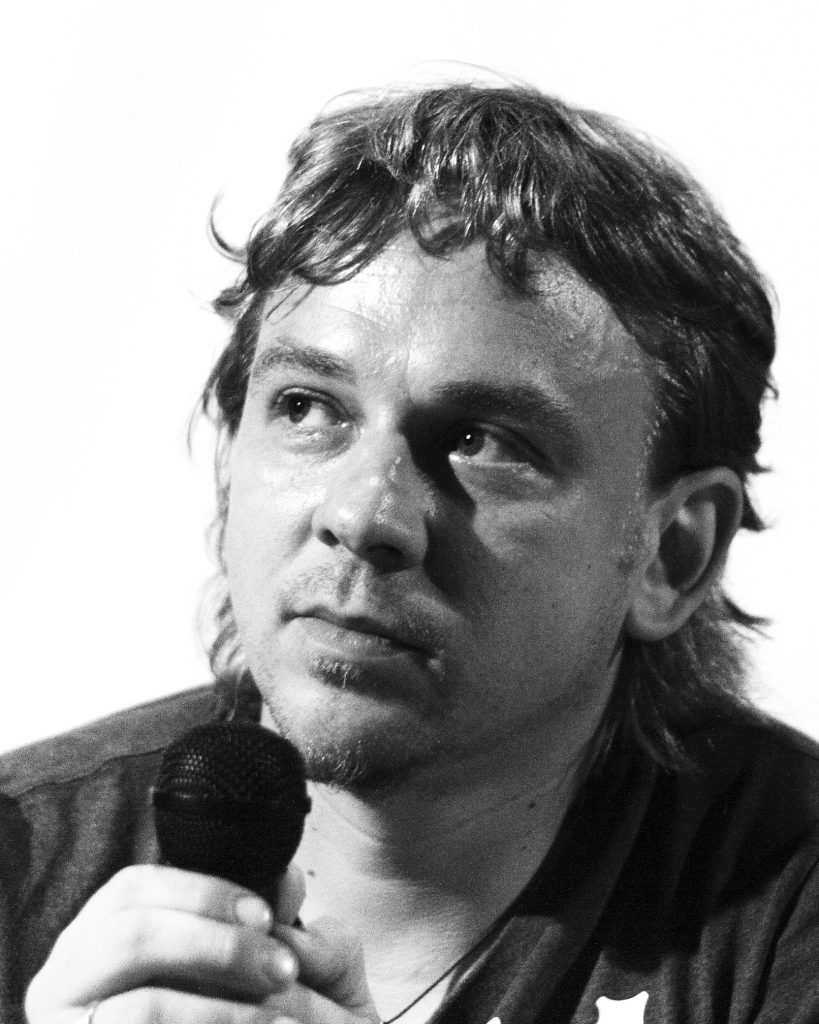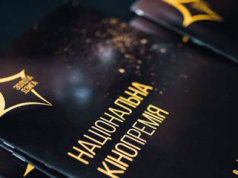A profile of musician Alexander “Fozzey” Sidorenko, who has branched out to becoming a well known writer.
Of all Ukraine’s musicians, Fozzey is the only one to have earned a serious reputation in the literary world. For adults, he writes about the recent past. For children, he writes about folkloric heroes. His books — “We Ate Water From the Tap,” “Needles and Skates,” and “Accompanying Persons” — combine an ease of form with a depth of meaning. In July 2017, Fozzey published his most recent work, a book of short stories called “It’s Getting Dark Early.”
Fozzey’s stories leave a bittersweet aftertaste. They express a certain sadness about this ungainly world, yet they are full of trepidation and respect for life. It is difficult to part ways with Fozzey’s characters: you almost want to hug them on the last page and not let them go.
In many ways, these books are a continuation of the author’s musical experience. Born in Kharkiv in 1973, Alexander “Fozzey” Sidorenko is one of the founders of “Tanok na Maidani Kongo” (TNMK) — literally, “Dance on Congo Square.” In the 1990’s, TNMK adapted hip-hop for Ukrainian culture.
Fozzey was primarily responsible for the group’s lyrics, which demonstrated the writer’s prodigious literary talent. Fozzey’s lyrics combined wordplay, creative phrasings, and massive doses of irony.
Writing is easy
“Since I’m not a real writer and it’s more like a hobby, it’s very easy for me to make myself write. I tie some kind pleasure to it — for example, I promise to treat myself to a cigar [afterwards],” Fozzey says, and his face lights up with a smile. Professional writers may mandate that they work eight hours or produce ten pages each day, but Fozzey has a more romantic attitude toward literature.
He has no strict rules or discipline, only pleasure from the process. However, there are other aspects of his career where he is strict. Fozzey writes columns about films and television for the press. In this freestyle journalistic genre — perhaps the closest to literature — he can sharpen metaphors and try different methods of writing.
“I invented these chores intentionally to make myself spend less time playing computer games,” he says. “Every week, I make a schedule and follow it. And writing books is for pleasure.”
Fozzey’s facial expression mirrors his subject matter. When talking about his journalistic work for the media, it’s tense. But when he expounds on literature, his features grow softer.
Fozzey loves to play football. But last year, he broke his leg during a match. He had never before had so much time to work on his books. And he gave himself over to this favorite activity completely. During his recovery, Fozzey essentially outran himself: By July, when he published “It’s Getting Dark Early,” he had almost completed his next book. He could have finished it. Instead, he delayed the finale to prolong the pleasure of writing it.
For Fozzey, literature is the territory of personal creativity. In TNMK, it’s a completely different, he explains. Writing for the band is more difficult, because, with each written word, Fozzey must take into account the opinions of his bandmates.
“A few days ago, we had a free day in Odessa between concerts. Everyone was swimming, and I was sitting and thinking up words for a new song,” Fozzey says.
Then, Oleg Mikhailyuta — the second frontman of TNMK, known by the nickname “Fagot” (“Basoon”) — came ashore and said it was no good. So, Fozzey did a second version of the song. His bandmates didn’t like it. He tried a third time. Still no go.
“When you come up with the words for a song, you then have to pass an exam: The guys listen and then they say half-heartedly, ‘Well, it’s interesting…’ And you understand that, in fact, it’s not interesting. You need to redo it,” he says.
Friend of the groom’s best man
Fozzey has published close to ten books, but he does not consider himself a standard writer. To be a true writer fully engaged in the literary world, you must read a lot of new books —”But I usually reread old stuff over and over again,” he says. A real writer must also write a lot and then rewrite it. “So, in literature, I consider myself to be a friend of the groom’s best man,” he smiles.
I ask why he so actively reread old works if there is so much new literature around. His response is instantaneous: “Rereading your favorite books is a guaranteed joy.”
This tendency to reread dates back to Fozzey’s childhood. He even read Leo Tolstoy’s War and Peace four times. Now he’s revisiting George R.R. Martin’s Game of Thrones series. He listens to the audio books in large doses while walking his dog. He loves it, but the dog isn’t thrilled: After so many extremely long walks, the dog only reluctantly ventures out with him, Fozzey says.
But Fozzey’s ambivalence towards new literature does not extend to modern Ukrainian writers. He praises the poet Serhiy Zhadan, who writes “as if he were telling it from an armored car.” He also respects Vladimir Rafeenko for his “viscous style.” For Fozzey, modern national literature is more than just art.
“We must develop very quickly now, because this is a question of the country’s survival,” he says.

Life as material
“I don’t invent anything for my books,” Fozzey admits. “I have no shortage of the material that life gives me. I always have a lot of ideas and plans.”
This is very believable. Fozzey’s characters appear too realistic to be made-up. When he wrote his first book, “We Ate Water From the Tap,” he got a lot of ideas for stories from daily life. He diligently wrote them all down, and they lay in waiting for their turn. Periodically, Fozzey looks through these notes and finds stories for new books. Once he has the right idea, he only needs to wait for the proper moment. Then, during a trip to the seashore or while on tour, he can write a story in five or six hours.
“My main characters are based on my friends and friends of friends,” Fozzey says. “In my new book, for example, there’s a story about how my friend was given a dog. I need to ask him whether he’s okay with me writing about it.” It’s a bit late for that; the book has already been printed.
Often, life gives Fozzey ready-made stories. They come spontaneously and unpredictably. For example, some relatives who work as doctors recently told him the story of a doctor who operated on Lenin’s personal physician. The surgeon removed his patient’s only kidney, and Lenin’s physician died. “I immediately wrote this story down in my notebook,” Fozzey says. “I couldn’t miss it.”
When Fozzey utters these words, he has the facial expression of a hunter. Although he calls literature a hobby, he clearly has the writer’s instinct. He collects life, which then spills out onto the pages of his books. Even in his heroic fairy tale for children, “Gupalo Vasil,” he tried to preserve the language he discovered in real life.
“I wanted the hero to speak incorrectly. It’s important,” he says. “As a result, the publishing house decided to indicate that the book was written in ‘the author’s language.’ The editor must have fainted when he read it.”
Most of Fozzey’s characters come from the past. He does not care to write about the present for a very specific reason: “For me, literature and cinema are divided into two historical periods — before the advent of the mobile phone and after,” he says. The authors of modern plots must always find ways to get rid of their characters’ phones — dropping the phone in water or having the character lose it. Otherwise, how can you make the story move if the character can solve all the problems in ten seconds with a simple phone call?
“You can’t send everyone to the desert, where there’s no mobile service,” he says. “It’s not the Bible.”
Path to freedom
“It’s Getting Dark Early” is about the Soviet 1980’s. Fozzey considers it a gloomy and troubling time. Millions of Soviet citizens considered the country unshakable, yet it was collapsing, unbeknownst to them.
The author has little love for the Soviet Union, but he is sympathetic to those who have not been able to readapt to the world of increased freedom and responsibility that emerged after the Soviet collapse.
“They are unlikely to ever accept the logic of capitalism, where everything depends on your own decisions,” he says. “Under capitalism, you live while you’re moving, and you die if you stop. The USSR allowed even those who stopped to somehow function.”
Our conversation drifts into very philosophical topics. We discuss how the era of revolutionary words has transformed into the era of audiovisual media. Now, people receive and perceive reality differently than in the past. Although he is an avid computer gamer, Fozzey admits he does not keep up with trends. He has no idea what teenagers watch on Youtube or how anyone but himself plays video games.
I recall a recent scientific study that found that the less a person reads books, the less his brain develops. I ask Fozzey’s opinion of this. Is our love for moving pictures destroying us?
“All generations say that the world is going nowhere, yet humanity is constantly improving,” Fozzey says. “Everything will be fine, but it will be very different. You must get used to not understanding things.”
“The main thing is to figure out what you were created for and take action.”
Igor Panasov is a music critic based in Kyiv.




































